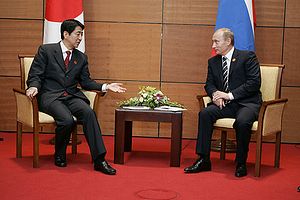Despite both sides issuing formal sanctions, neither Russia nor Japan appear intent on allowing the conflict in Ukraine to affect their interest in bilateral relations. Neither country wants to lose the opportunity to settle the issue of the disputed Kuril Islands (called Northern Territories in Japan) that in turn could lead to expanded cooperation on Russian energy exports, which is of increasing importance to Japan. How this relationship might affect Japan’s alliance with the U.S. is worth addressing.
Russia last Friday responded to Japan latest sanctions with a round of its own. Reuters reported that the Russian foreign ministry gave a list to the Japanese ambassador in Moscow of Japanese citizens barred from entering the country. A Japanese government source said the list included lawmakers. However, Japan’s recent sanctions were not as strong as its U.S. and European allies, and Russia’s list is unlikely to include citizens currently involved in investment projects, or lawmakers deemed useful in returning relations to normal. To that end, Russian Foreign Minister Segey Lavrov said Russia is still planning for President Vladimir Putin to visit Japan this fall as previously discussed. While stating that Putin had accepted Japan’s proposed itinerary, he said that the Russia-Japan relationship was separate from the ongoing conflict in Ukraine.
On Monday, in response to the news that the meeting between Putin and Prime Minister Shinzo Abe appeared to be going forward, the U.S. state department’s reaction was minimal. Spokeswoman Jen Psaki said she “would not say we have any objections. We are in frequent contact with the Government of Japan, as well as our other G-7 partners, and we’re cooperating closely with them. I think, beyond that, I would refer you to the Government of Japan.”
There is not necessarily any conflict of interest for the U.S. in its ally negotiating with Russia. Japan could prove to be a useful intermediary because it has very little at stake in Ukraine, yet would benefit from a reduction in tensions between Moscow and its Western allies. Alternatively, an increase in Russian interest in Northeast Asia that is tied to a U.S. ally is also beneficial to Washington, as it could balance against Russian ties to China, and also possibly help to check Beijing’s regional influence. As long as Russia and Japan’s negotiations do not negatively impact Washington’s current strategy in Ukraine it will probably remain quiet. Even though the U.S. is seeking to force Russia to pull back in Ukraine by hurting it economically through sanctions, Moscow and Tokyo are not close to signing any deals that would substantially benefit Russia’s economy. The issue of the disputed islands would have to see progress first, no small feat in itself, before significant energy deals would move forward.

































